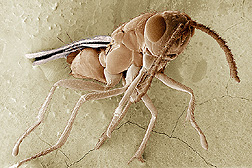This page has been archived and is being provided for reference purposes only. The page is no longer being updated, and therefore, links on the page may be invalid.
|
Read the magazine story to find out more. |
Honey Boosts Effectiveness of Parasitic WaspsBy Jim CoreAugust 19, 2002 Feeding honey to a parasitic wasp from Brazil helps it attack pest flies in the United States more vigorously, Agricultural Research Service scientists and cooperators report. ARS scientists at the Center for Medical, Agricultural and Veterinary Entomology in Gainesville, Fla., and cooperators at the University of Campinas in Brazil are evaluating the Brazilian wasp as part of an effort to screen exotic wasp species from that country that may be biocontrol candidates against flies in the United States. Certain parasitic wasps native to the United States are now used to control houseflies and stable flies, which are nuisances on livestock and poultry farms and transport disease-causing organisms, according to entomologist Christopher J. Geden at the ARS lab in Gainesville. The parasitic wasps reduce insecticide use while saving farmers time and money. Farmers can buy native parasitic wasps from commercial insectaries. But the effectiveness of native parasitic wasps is limited, because they will only feed on and lay their eggs inside fly pupae. One foreign wasp species being evaluated (Tachinaephagus zealandicus) attacks flies in the earlier larval stage. Used together, the native and parasitic wasps could attack flies in their larval and pupal stages, resulting in more effective fly control. Unlike native wasps, however, foreign wasps do not derive energy from their hosts, according to Geden. So they need an energy boost. The researchers found that feeding the wasps honey tripled their attack rate on target flies and increased the amount of progeny developing in flies. The Gainesville and Brazilian researchers also discovered that honey treated with the antibiotic rifampicin helps T. zealandicus ward off a debilitating new disease transmitted from females to their offspring. Infected wasps take longer to develop into adults and lay substantially more male eggs--a real barrier for rearing wasps for biological control. A detailed story about this research appears in the August issue of ARS' Agricultural Research magazine. ARS is the chief scientific research agency of the U.S. Department of Agriculture. |

